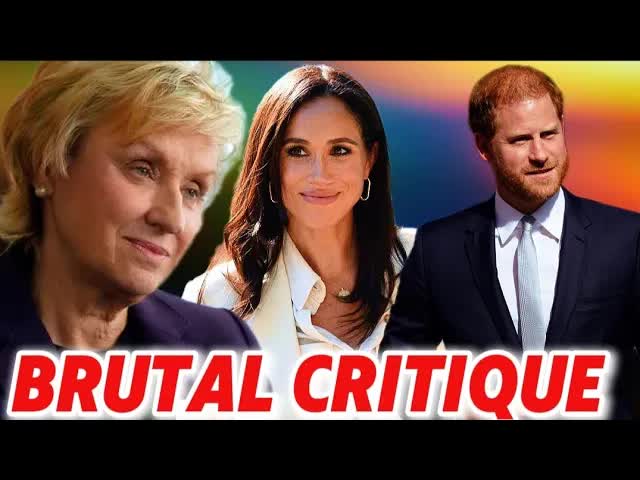In the ever-evolving landscape of celebrity and royalty, the recent comments made by Tina Brown regarding Meghan Markle have ignited a fierce debate.
Brown, a renowned journalist and former editor of Vanity Fair and The New Yorker, has never shied away from controversy.
Her latest critique, shared during an interview to promote her new Substack newsletter, “Fresh Hell,” has sent ripples through the media and public alike.
Brown’s sharp words reflect a growing discontent about the royal family’s current state, particularly in light of recent health issues affecting its members.
She expressed a sense of loss regarding Prince Harry’s absence, suggesting that his departure has left a significant void within the monarchy.
The discourse surrounding the royals has shifted dramatically, with many questioning whether the rift between Harry, Meghan, and the rest of the family is irreparable.
The conversation quickly turned to Meghan herself, who has been a polarizing figure since her entry into the British royal family.
Brown did not mince words, accusing the Duchess of Sussex of harboring misguided ambitions and demonstrating a stubborn nature.
Her critique extended beyond mere actions; it delved into Meghan’s motivations and character, painting a complex portrait that resonated with many while infuriating others.
As Brown’s interview went viral, snippets of her remarks spread like wildfire across social media and news outlets.
In this digital age, her words reached a global audience, sparking discussions that highlighted the deep divisions surrounding Meghan’s role within the royal narrative.
Many felt that Brown’s comments encapsulated a broader cultural clash between Hollywood’s celebrity-driven ethos and the traditional values upheld by the British monarchy.
The backlash was immediate and intense.
Supporters of Meghan rallied, arguing that Brown’s critique was overly harsh and dismissive of the challenges she faced.
They pointed out that Meghan’s journey from Hollywood actress to royal was fraught with scrutiny and expectations that few could endure.
This ongoing debate underscores the societal issues surrounding race, class, and privilege that Meghan’s story represents.
Brown’s portrayal of Meghan as someone out of her depth struck a chord with those who have followed her transition into royal life.
The suggestion that Meghan’s Hollywood background had ill-prepared her for the demands of royalty resonated with critics who believe she underestimated the institution’s complexities.
However, this view was met with resistance from those who see Meghan as a visionary, challenging the status quo with her progressive ideals.
The conversation around Meghan is not merely about her actions but reflects larger themes of identity and power dynamics.
Some argue that her decision to step back from royal duties was a courageous act of self-preservation rather than a failure to adapt.
For many, Meghan embodies a new generation of royals, one that prioritizes mental health and social justice over antiquated traditions.
As the debate rages on, it becomes clear that the relationship between the media and the royal family remains contentious.
Brown’s comments serve as a reminder of the scrutiny that follows Meghan and Harry as they navigate their own path outside of royal life.
Their every move is dissected, revealing a collective obsession that often borders on the invasive.
While Brown’s critique painted Meghan in a less-than-flattering light, it also sparked a dialogue about the evolving nature of celebrity and duty.
Supporters of Meghan argue that her advocacy work and commitment to social issues showcase her strength and integrity, contrasting sharply with Brown’s characterization of her as power-hungry.
This juxtaposition highlights the complexities of public perception and the narratives that shape our understanding of these figures.
In a world where media narratives can make or break reputations, Meghan’s story continues to captivate and divide.
Her resilience in the face of relentless criticism and her determination to champion marginalized communities resonate with many who feel unheard.
Meghan represents a shift in the royal narrative, one that embraces diversity, equality, and social responsibility.
As the dust settles from Brown’s fiery remarks, it remains to be seen how this will impact Meghan and Harry’s journey.
The scrutiny may not wane, but their commitment to forging their own path suggests a willingness to challenge the norms that have long governed the royal family.
In this ongoing saga, the lines between admiration and criticism blur, reflecting society’s complex relationship with fame, duty, and identity.
